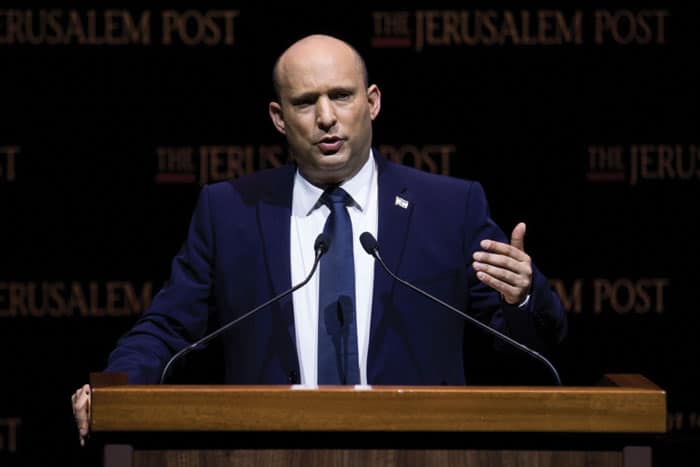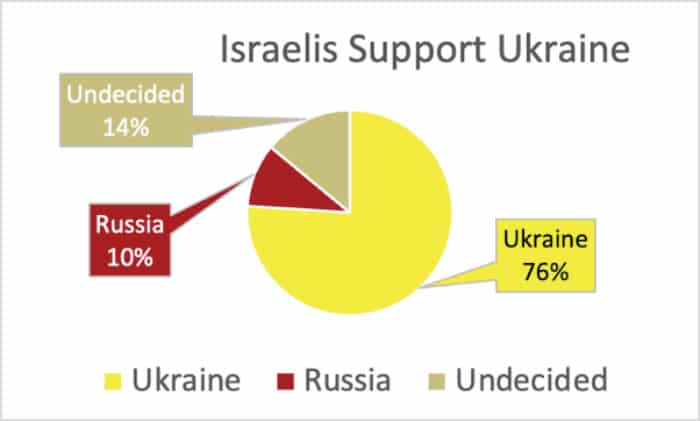 Prime Minister Naftali Bennett
Prime Minister Naftali Bennett Prime Minister of Israel, Naftali Bennett, is a risk taker. That’s the only way to become a PM with six seats in the parliament. That’s the only way to become a player in a dramatic war that has nothing to do with your country. Israel is small, and the Russian war against Ukraine is the turf of large countries and superpowers. Israel is far, and the Russian war against Ukraine concerns closer countries in Europe. Israel decided to be cautious about the war because there’s Russian military on its northern border, in Syria.
But the PM, Bennett, is not a cautious man. He is a risk taker. And as Israel, Bennett included, was guardedly trying to find its right footing amid this global crisis, it forgot to take into account the one component that matters: the predispositions of its leader.
Thus, on a Saturday, this Shabbat-observing Jew, a leader of a small, faraway country, was on an airplane – one that is usually used by the Mossad, Israel’s intelligence agency – making its way to Moscow. A three-hour meeting with Russia’s Vladimir Putin followed, then a quick stop in Germany, where Bennett met the Chancellor, merely two days after their previous meeting in Jerusalem. He made a phone call to France’s President. He updated Washington. On Tuesday, Foreign Minister Yair Lapid was on his way to meet with the US Secretary of State. The “cautious” country suddenly seemed like a global player.
We don’t know what Putin told Bennett. We don’t know what Bennett told Putin. We do know that no immediate cease fire ensued, no end to the war. And yet, Israel is trying to use its special status to advance a peaceful solution to a terrible war. Bennett says that even if this is a long shot, it is worth pursuing. And yet the nature of risk taking is that there is risk involved, not just the reward of being recognized as a world leader in pursuit of peace.
What could go wrong? Ask French President Emmanuel Macron. About two weeks ago, Putin deceived Macron to believe that the Elysée Palace could prevent war by mediation.
What could go wrong? Ask French President Emmanuel Macron. About two weeks ago, Putin deceived Macron to believe that the Elysée Palace could prevent war by mediation. Two days later, the Russians invaded Ukraine. Deception is a recurring theme in Russian strategy. It’s not impossible that Putin is toying with Bennett, using him. It’s not impossible that when this becomes clearer, the Americans will be annoyed by Bennett’s moves, and berate him to stop sowing a delusion of an impending solution to the crisis.
In the background, other challenges loom. Ukraine’s president, a world hero, a symbol of courage – and a Jew – is somewhat disappointed with Israel. Bennett, he said, doesn’t seem to be “wrapped in our flag”. A national debate about absorption of refugees further complicates Bennet’s life. The government’s tendency is to consider Israel’s absorption of Jewish refugees as its share of the global burden, but is facing criticism that such policy is not in line with the duty to rescue people without preference of religion or race.
And then there’s Iran. As the attention of the world is focused on Ukraine, the talks in Geneva continue, inch by inch, towards something that Israel, yet again, is going to call a “bad deal”. Surely, when Bennett was meeting with Putin he wasn’t just talking about peace in Ukraine, about Israel’s wish to allow Jews to flee and make Aliyah, but also about Iran.
Consider this: Russia currently benefits from Western sanctions on Tehran, as it leaves Iran no choice – it must trade with Russia. Consider this: If there is an agreement with Iran, and the sanctions are lifted, then Iran will be able to sell its oil to the West and thus weaken Russia’s main leverage, Europe’s dependence on Russian energy. Consider this: Putin is in no mood to hand the US a diplomatic victory, and Washington, unlike Israel, considers a new version of the JCPOA a diplomatic victory.
By this we remind ourselves that everything is connected. Germany’s Chancellor coming to Jerusalem (last Thursday) – that’s connected. Israel’s President Herzog visiting Turkey (this Wednesday), thus moving forward a long and painful process of amending the relations – that’s connected. An attack from the air near Damascus (on Tuesday) – that’s connected. Does Bennett want to be the pivot of peace in Ukraine? Of course he does. Would he make do with a lesser achievement, one that serves Israel’s interests at this moment of global instability? As Israelis, we never forget that taking care of Israel’s interests is Bennett’s full-time job.
Something I wrote in Hebrew
And here’s a paragraph from an article about Israel’s ongoing struggle with balancing its interests and moral vocations:
The debate on the absorption of refugees from Ukraine contrasts two conflicting values, each of which is more important to different groups in Israel’s society. One is the desire to sustain Israel as a Jewish state, that is, to absorb mainly Jews as immigrants. The second is the desire to act in the world as a moral agent. When there are refugees that need saving, we don’t ask them who they are, just what they need, along with the rest of the international community. How do you reconcile a conflict between two important values? Compromise is the accepted way. In Israel’s case this means many of these (Jews) and some of those (non-Jews).
A week’s numbers
The government must be cautious, but the public in Israel is not different than the publics all around the western world: its heart is with Ukraine (source: Makor Rishon survey).

A reader’s response:
Elly Nazarian sent this question: “What ever happened to the trial of Bibi Netanyahu?” Answer: it’s still moving forward, slowly.
Shmuel Rosner is senior political editor. For more analysis of Israeli and international politics, visit Rosner’s Domain at jewishjournal.com/rosnersdomain.























 More news and opinions than at a Shabbat dinner, right in your inbox.
More news and opinions than at a Shabbat dinner, right in your inbox.